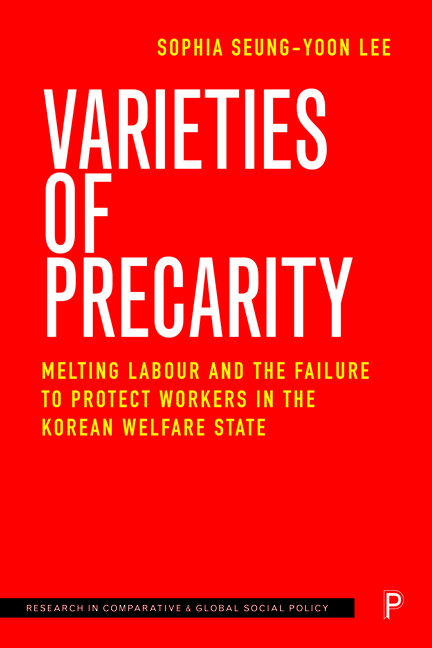 Varieties of Precarity
Varieties of Precarity Book contents
- Frontmatter
- Contents
- Series editors’ preface
- List of figures and tables
- Acknowledgements
- 1 Introduction: Melting labour and institutional inconsistency
- 2 Social protection policies and the South Korean labour market in comparative perspective
- 3 When insiders are kicked out: layoffs of regular workers in manufacturing
- 4 Same boat, different destiny: subcontracted workers in the Korean shipbuilding industry
- 5 Young and old outsourced female workers in call centres and cleaning services
- 6 Are freelancers really free? The Korean freelance labour market and the precarity of young freelancers
- 7 The digital precariat: various Korean platform workers and the new work logic
- 8 Conclusion: Towards universal institutional protection for precarious workers in the era of melting labour
- Notes
- References
- Index
4 - Same boat, different destiny: subcontracted workers in the Korean shipbuilding industry
Published online by Cambridge University Press: 03 April 2024
- Frontmatter
- Contents
- Series editors’ preface
- List of figures and tables
- Acknowledgements
- 1 Introduction: Melting labour and institutional inconsistency
- 2 Social protection policies and the South Korean labour market in comparative perspective
- 3 When insiders are kicked out: layoffs of regular workers in manufacturing
- 4 Same boat, different destiny: subcontracted workers in the Korean shipbuilding industry
- 5 Young and old outsourced female workers in call centres and cleaning services
- 6 Are freelancers really free? The Korean freelance labour market and the precarity of young freelancers
- 7 The digital precariat: various Korean platform workers and the new work logic
- 8 Conclusion: Towards universal institutional protection for precarious workers in the era of melting labour
- Notes
- References
- Index
Summary
‘An acquaintance of mine … fell from a height of some 30 metres and died. But people just wiped the blood out and went back to work. Seeing things like that drives me nuts.’ (In-house worker of a sub-subcontractor)
‘Profits of employers of subcontracted workers vary depending on how much they save on the four major social insurance premiums and severance pay.’ (Tax accountant)
Fissured workplaces and the expansion of subcontracting
This chapter delves into the employment structure of subcontracting within the shipbuilding sector, a practice that has become widespread among conglomerate-led manufacturing industries. The chapter primarily investigates the transformation of the prevalent employment structure involving contractor– subcontractor agreements in the shipbuilding industry, an area dominated by conglomerate manufacturing companies that are part of the so-called Korean insider labour market. It also explores the experiences of subcontracted workers within Korea’s social safety net, examining elements such as the employment and wage structures, working patterns, and the relationship between subcontracted workers’ labour market experiences and social security. The case study in this chapter aims to bring attention to the employment status of subcontracted workers who are excluded from institutional protections typically afforded to regular employees, thereby highlighting the plight of nonregular and subcontracted workers within the context of a fissured workplace and inconsistent institutional protection policies.
Since the 1970s, traditional Fordism, based on a rigid mass production labour process, has been replaced by flexible scaling of resource inputs. This shift enhances flexibility in terms of geographical change, labour markets, production processes, consumer markets and work process decentralisation, except for core competence areas (Kalleberg et al, 2021). Changes in capital accumulation methods through micro-adjustments have significantly increased workers’ employment insecurity.
During the process of subcontracting or outsourcing all work processes, except for a few core competence areas, companies can exert pressure on subcontractors to reduce costs and increase efficiency. Developed countries have pursued capital accumulation by hiring subcontractors from developing countries for cost reduction. Similarly, at the national level, the subcontractor base has expanded, with large companies increasingly outsourcing their production processes, except for core competence areas. In their quest for higher flexibility and lower production costs, contractors outsource various competence areas and parts in the process of mass production of standardised goods.
- Type
- Chapter
- Information
- Varieties of PrecarityMelting Labour and the Failure to Protect Workers in the Korean Welfare State, pp. 76 - 97Publisher: Bristol University PressPrint publication year: 2023


